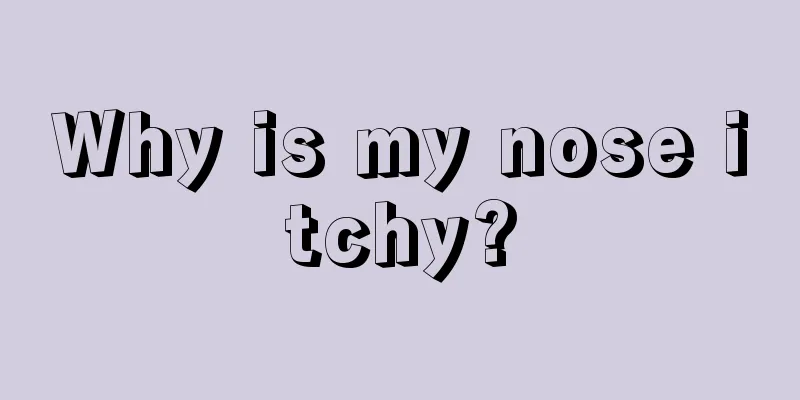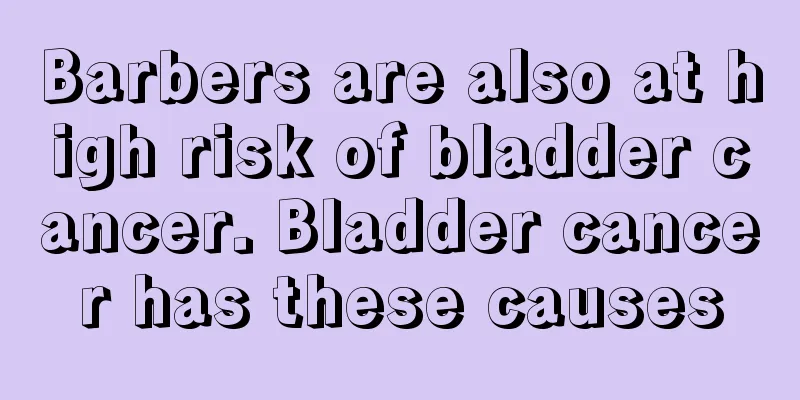Why is my nose itchy?

|
An itchy nose is a common symptom of rhinitis, which often occurs in dry seasons and is called dry rhinitis. Some patients will pick their noses with their fingers because of discomfort, resulting in nasal bleeding; it may also be caused by pollen allergy in spring. If this situation is not curbed in time, it is easy to suffer from allergic rhinitis. 1. What causes an itchy nose? Dry and itchy nose is called "nasal dryness" in traditional Chinese medicine, which often induces patients to pick their noses and cause small nosebleeds. In this case, don't pick your nose with your hands frequently. An itchy nose is a common symptom of rhinitis, and specifically it is the most important symptom of dry rhinitis. Traditional Chinese medicine calls it "dry nose". The disease is more common in people with weak constitutions and those who often inhale unclean gases. Patients feel dryness and discomfort in their noses, or a tingling or foreign body sensation, which often induces them to pick their noses, causing small amounts of nosebleeds. The occurrence of dry rhinitis is closely related to climate and occupational factors. It is caused by long-term stimulation of the nasal mucosa, which leads to atrophy of the mucus glands and reduced secretion, resulting in dryness of the mucosa and even superficial erosion. Spring in the north is windy and dry, and the human body easily loses a lot of water through sweating and breathing. In addition, the weather change is unpredictable, which makes it easy to "get angry". Many people's nostrils are very dry and itchy, so they can't help but pick their noses with their hands. As a result, the more they pick, the more itchy it becomes, and even bleeding. In addition, the air in spring is full of pollen. Coupled with the windy and dry weather, dust and animal fur also float in the air. These are allergens. When people come into contact with these allergens, they can easily develop allergic rhinitis. 2. What to do if your nose itches Based on the reasons for itchy nose analyzed above, let’s now find out what we should do if our nose itches? 1. Avoid contact with allergens (1) The number of dust mites in the room should be less than 20/m2; maintain the relative humidity of the living space below 60%, but too low (such as below 30%-40%) will cause discomfort; sweep the carpet; wash bedding and curtains. Mite allergens are soluble in water, and washing textiles can remove most of the allergens; use air purifiers and vacuum cleaners with filters. (2) Avoid allergens during the corresponding pollen allergy season. (3) Patients who are allergic to animal fur should avoid allergens. 2. Drug treatment Intranasal and oral administration are commonly used, and the efficacy may vary between different patients. There is no long-term sustained efficacy after discontinuation of the drug, so maintenance treatment is required for persistent allergic rhinitis. Prolonged treatment does not lead to rapid drug resistance. Intranasal administration has many advantages. High concentrations of drugs can act directly on the nose, avoiding or reducing systemic side effects. However, for patients with other allergic diseases, drugs need to act on different target organs, and intranasal administration is not the best choice. Systemic drug treatment is recommended. (1) Antihistamines Oral or nasal second-generation or new H1 antihistamines can effectively relieve symptoms such as nasal itching, sneezing and runny nose. It is suitable for mild intermittent and mild persistent allergic rhinitis, and can be used in combination with nasal corticosteroids to treat moderate to severe allergic rhinitis. (2) Nasal corticosteroids can effectively relieve symptoms such as nasal congestion, runny nose and sneezing. For critically ill patients who do not respond to other drug treatments or cannot tolerate nasal medications, oral corticosteroids can be used for short-term treatment. (3) Anti-leukotriene drugs are effective for allergic rhinitis and asthma. (4) Chromone drugs are effective in relieving nasal symptoms, and eye drops are effective in relieving eye symptoms. (5) Intranasal decongestants can relieve nasal congestion symptoms caused by nasal congestion, and the course of treatment should be controlled within 7 days. (6) Intranasal anticholine drugs can effectively suppress runny nose. (7) Some Chinese medicines are effective in relieving symptoms. The treatment principles for children and the elderly are the same as those for adults, but special attention should be paid to avoiding adverse drug reactions. (8) Pregnant patients should use various drugs with caution. |
<<: How to effectively treat asthma caused by allergic rhinitis?
>>: What are the early symptoms of kidney stones? Is it obvious?
Recommend
Heat exchanger scale cleaning method
I believe that every household now has a water he...
What to do if the house is damp
I believe that the problem of damp houses affects...
Four rules for eating fish: Four types of people should not eat fish
Fish is a rare healthy food. It tastes delicious ...
Can facial cleanser wash off liquid foundation?
Many people are too lazy to use makeup removers, ...
What foods are good for preventing liver cancer? Eating more of these three kinds of bamboo shoots can cure diseases and prevent liver cancer
Lettuce: Increase appetite, prevent anemia Lettuc...
Left eyelid ptosis_left eye upper eyelid ptosis
As people age, their skin begins to sag, especial...
What does cerebral palsy look like
Women will encounter various problems during chil...
How to wash off yellow spots on clothes
If you wear the same clothes for a long time, yel...
What are the benefits of soaking your feet in salt water
In recent years, with the improvement of people&#...
What can be found out by plain brain scan
The human brain is the most important part of the...
Which pillow core is better?
The pillow core is something we come into close c...
What to do if your hair is thinning
Many people don’t know what to do about their hai...
What are the treatments for oral herpes
Although oral herpes is not a serious disease, if...
How to preserve tea
Mr. Wang, a citizen, recently reported that the g...









